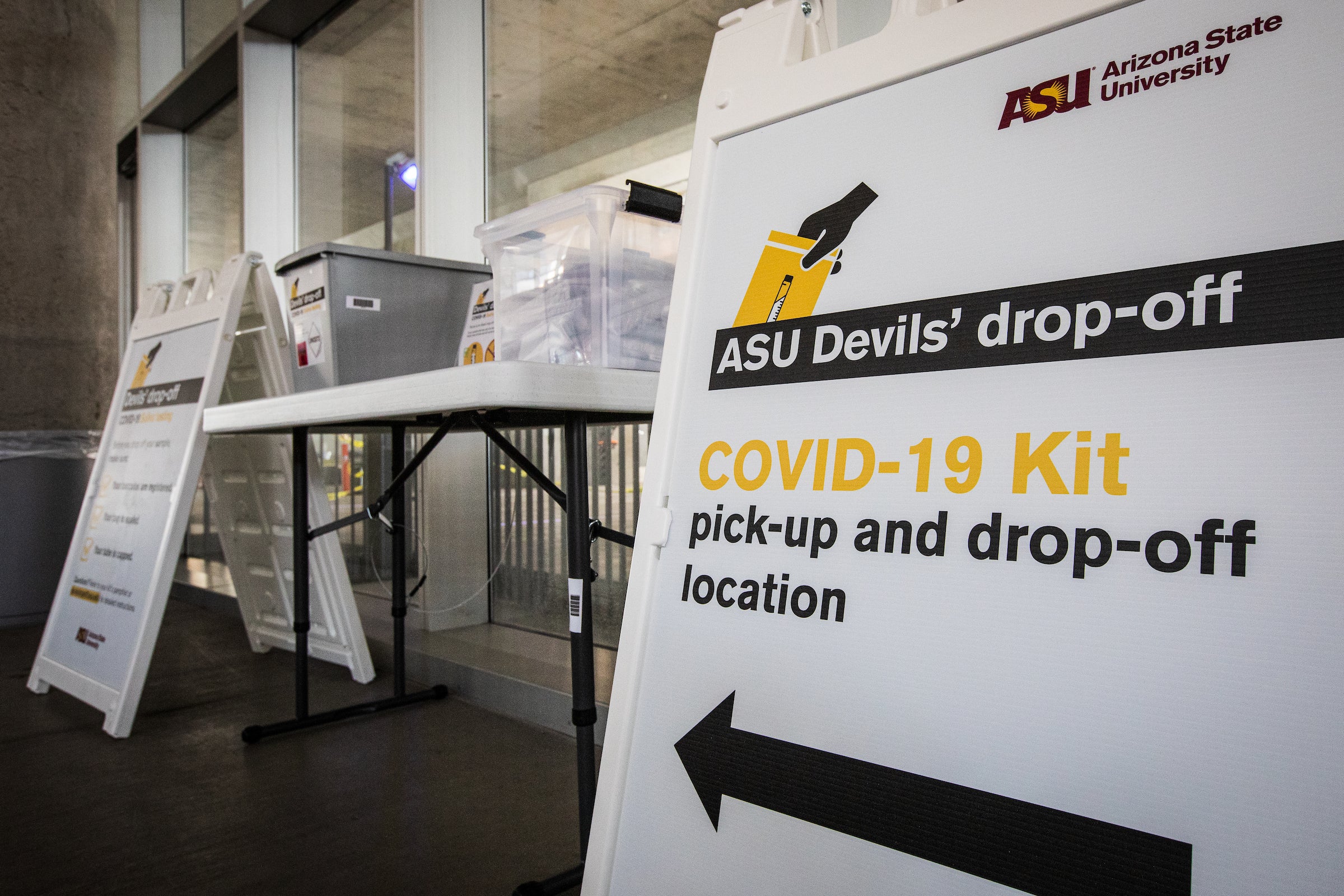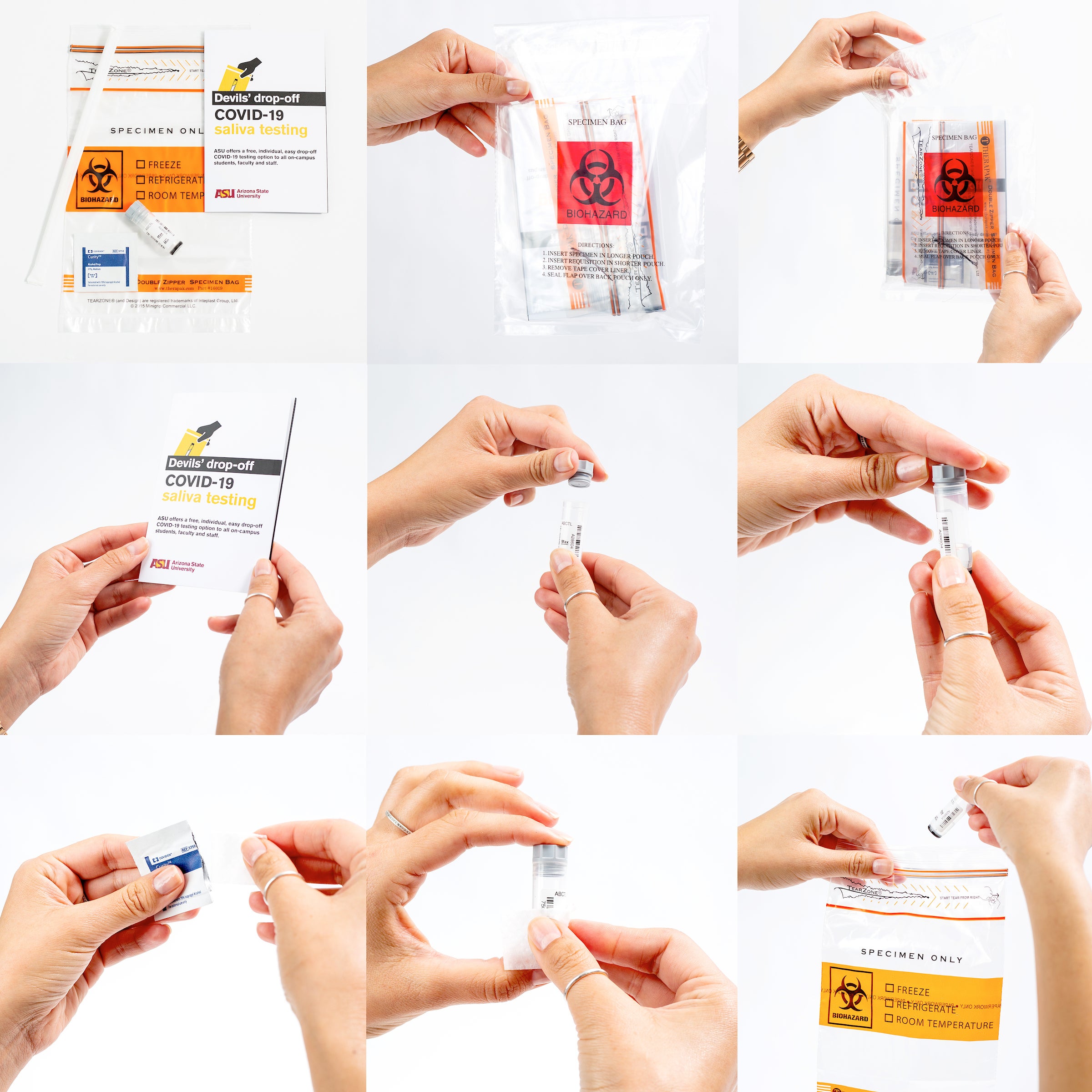The no-appointment Devils’ drop-off service — the latest in Arizona State University's free, saliva-based COVID-19 testing — makes it easier for Sun Devils to test regularly and provides ASU with vital virus contact-tracing details.
The new testing optionThe drive-thru testing locations will continue to operate. began in the spring 2021 semester and allows students and employees to take a test whenever fits their schedule. Regular testing is an important way to stay aware of any infections that may occur and to help reduce virus spread.
“If we can increase the participation more, we are likely to identify potential positives and then likely to increase the contract-tracing efforts in the community and stop the spread of the virus,” said Vel Murugan, an associate research professor at the ASU Biodesign Institute, where he oversees the development of diagnostic testing. As more people test regularly, Biodesign leaders have greater data for virus mitigation efforts.
ASU Biodesign created Devils’ drop-off as a frictionless testing experience — no appointment needed — and to boost access to COVID-19 testing. People now may pick up a Devils’ drop-off kit at one of over 30 locations across four Valley campuses. Users go online to register the barcodes found on the sample tube, find a private area to provide their saliva sample and then drop off their kit at a pick-up location. Staff then transport the kits to the Biodesign Institute for processing.
The Devils’ drop-off sites allow students, faculty and staff the convenience of picking up and dropping off ASU’s saliva-based COVID-19 tests at numerous locations on all four campuses in the Valley, such as the Computing Commons in Coor Hall on the Tempe campus (pictured). No appointment is needed — just grab a kit (clear bin), register the test tube online, provide a sample, then drop it off (gray bin). Photo by Charlie Leight/ASU News
Student Trey Leveque is a fourth-year triple business major and on-campus student worker. He said that his friends previously had resisted COVID-19 testing because they didn’t have a car or couldn’t make a last-minute appointment.
“(Devils’ drop-off) kind of eliminates all of those barriers that come with getting tested, so it makes it really easy for people,” Leveque said. “It’s so amazing when I’m on campus … to be able to just go pick up a kit and drop it off at my convenience.”
The benefits of Devils’ drop-off and quick test results make Katherine Hostal, a junior studying finance and business law, feel that more people will get tested regularly. She said her recent test processed via Devils’ drop-off came back in nearly 24 hours.
“(Devils’ drop-off) quite literally is the most effective and efficient testing that they’re probably going to have access to in the Valley,” Hostal said.
Biodesign Institute laboratory staff pivoted to integrate the new streamlined service with unique driving routes to pick up kits across all campuses.
“We’re actually able to ensure an almost faster turnaround time with Devil’s drop-off,” said Valerie Harris, a Biodesign Institute clinical laboratory manager.
While testing is necessary for virus management, ASU Biodesign researchers also select students willing to provide details about their virus exposure. As more students use Devils’ drop-off, researchers have the opportunity to obtain crucial information about the virus’s effect on the student population.
“We measure their antibodies, their virus load, their antigen” throughout their illness and afterward, Harris said.
Murugan said this research is essential as there is still much about the virus we don’t yet know. As vaccines continue to roll out, Murugan, who himself participated in a vaccine trial, cautions Sun Devils that the virus won’t merely go away. He said that COVID-19 testing would remain a vital part of ensuring a healthy campus.
“This is not the time for us to put our guards down,” he said.
How it works
Photo by Deanna Dent/ASU News
1. Pick up a test kit at one of over 30 locations across four Valley campuses.
2. Log into ASUsalivatest.site or Patient Portal and select "Devils' drop-off" on the left or the drop-down menu. Enter the two barcodes on your test tube. After entering the barcodes, you have 24 hours to collect your sample and drop it off.
3. When you're ready to take the test, rinse your mouth out with water for 20-30 seconds and then spit it out. Then wait half an hour — do not eat, drink, smoke, vape or chew gum for those 30 minutes.
4. Using the straw, fill the tube with saliva till it's between the maximum and minimum fill lines, not counting bubbles.
5. Cap the tube and wipe it with the provided sanitizer wipe. Put the tube in the provided bag and seal it.
6. Within one hour of collecting your sample, drop the sealed bag with the filled tube to one of the Devils' drop-off locations.
7. Wait for a text or email that lets you know your test results are ready. Results are usually ready within 24-48 hours.
Top photo illustration by Deanna Dent/ASU News
More Health and medicine

Reducing waste in medical settings
Health care saves lives, but at what cost? Current health care practices might be creating a large carbon footprint, according to ASU Online student Dr. Michele Domico, who says a healthier…

ASU offers bilingual counseling to Spanish speakers
Arizona is one of the five states in the nation with the highest percentage of Hispanic residents, according to the U.S. Department of Health and Human Services Office of Minority Health, and …

College of Health Solutions launches first-of-its-kind diagnostics industry partnership to train the workforce of tomorrow
From 2007 to 2022, cytotechnology certification examinees diminished from 246 to 109 per year. With only 19 programs in the United States, the cytology workforce that stands at the front line of…




